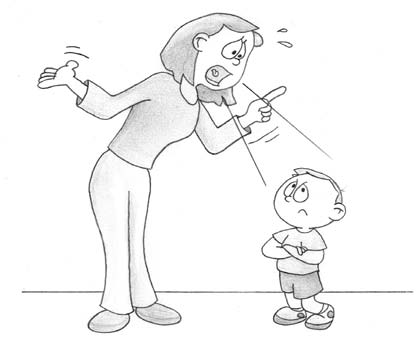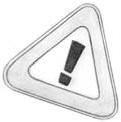The 1-2-3 Magic Workbook for Christian Parents: Effective Discipline for Children 2-12 (32 page)
Read The 1-2-3 Magic Workbook for Christian Parents: Effective Discipline for Children 2-12 Online
Authors: Thomas W. Phelan,Chris Webb
Tags: #Family & Relationships, #Parenting, #General

lacking in one’s life, positive self-esteem cannot be bestowed instantly in a
kind, insightful moment, in a weekend workshop, or in a positive summer
camp experience. Self-esteem is based on reality, not gimmicks.
There is a story about a fourth-grade teacher—a very nice, well-
meaning lady—who was very concerned about fostering self-esteem in
her students. One day during geography, she asked the class a question:
YOUR CHILD’S SELF-ESTEEM 181
“What is the capitol of Egypt?”
One young man in the back of the room waved his hand
enthusiastically.
“Johnny?” said the teacher.
“Mississippi.” Johnny replied confidently.
Temporarily taken aback, but not wanting to injure her young student’s
developing self-concept, Johnny’s teacher quickly recovered and said,
“That’s the correct answer to another question.”
This adult maneuver is an example of a superficial gimmick designed
to protect a young boy’s self-esteem. The correct response from the teacher
should have been: “Wrong.”
The issue here is this:
Realistic and positive self-esteem is the by-
product of a life well-lived
. Living life well, in turn, is based primarily
on four things: social competence (getting along with others, feeling
loved and appreciated), work competence (for kids this largely involves
school, but it also involves independent self-management skills), physi-
cal competence (physical skills and caring for one’s body), and character
competence (ability to follow the rules, effort, courage and concern for
others). By and large, therefore, whatever you do as a parent to help your
child become competent in these areas is going to improve your child’s
self-esteem.
Our Three Parenting Steps and
Your Child’s Self-Esteem
When you began with our first parenting step, counting obnoxious behavior,
you were helping your child with her self-esteem in a very important and
basic way. No one, child or adult, is going to get along very wel with others
if she is continually arguing, whining (adults whine too!), teasing, yelling
or putting others down. Obnoxious people have a hard time making and
keeping friends. Learning self-control and not doing what you shouldn’t
is also a big part of the last self-esteem element—character.
Second, when you started systematical y encouraging positive (Start)
behavior, you were also helping your child with his self-esteem, because
Start behavior involves learning how to independently manage your life.

182 1-2-3 MAGIC
Kids who know how to get out of the house in the morning, complete
their homework, feed the dog and get to bed—on their own—naturally
feel better about themselves. Independence makes kids proud.
Finally, having a good relationship with your child—and work-
ing to strengthen that relationship—is obviously a big part of the social
competence element of self-esteem. As your kids get older and older,
they will be required to get along with more and more other children as
well as with more and more adults. In their relationship with you, your
youngsters get their critical first experience with the ins and outs of get-
ting along with somebody else.
There is another very good reason for working on your relationship
with your child: Keeping your relationship positive, enjoyable and healthy
will make the other two parenting tasks—counting obnoxious behavior
and encouraging good behavior—much, much easier.
In the next few chapters we’ll discuss some simple but effective
ways to improve and build your relationship with your children. Chapter
22 will explain how to avoid a big self-esteem killer: overparenting. In
Chapter 23 we’ll provide some helpful tips on the issues of praise and
affection. Then, in Chapter 24, we’ll have a big surprise for you regarding
the notion of family togetherness and what to do about it. Chapter 25 will
explore the ins and outs of a too-often-forgotten parental task: listening
sympathetically to the little ones. In that same chapter, we’ll discuss how
to integrate listening with counting. Turning that switch from warm to
demanding and back—again and again—is no easy task!
Key Concepts...
Healthy self-esteem is based on four elements:
1. Good relationships with other people
2. Competence in work and self-management
3. Physical skills and caring for one’s body
4. Character: courage, effort, following the rules and
concern for others

22
Overparenting
Anxious parent, angry child
Recently I was in a grocery store standing in front of the dairy case. As
I was trying to decide which kind of milk to buy, I noticed a mother
with a girl, about nine, pushing a cart and coming around the corner to-
ward me. As they came closer, the mother said anxiously, “Now watch
out for that man over there!”
I’m an average-sized adult male of about 180 pounds. There was no
way this young lady was not going to see me. Even if she had been travel-
ing at 40 miles per hour, she would still have had plenty of room to stop
before crashing into my legs. Mom’s comment was an example of what
we sometimes call “overparenting.” Overparenting refers to
unnecessary
corrective, cautionary or disciplinary comments made by parents to kids.
These parental comments can be unnecessary for several reasons:
1. The child already has the skill necessary to manage the
situation.
2. Even if the child doesn’t have al the necessary skil s to managè
he situation, it would be preferable for the youngster to learn
by direct experience.
3. In addition to 1 or 2, the issue involved is trivial.
183
184 1-2-3 MAGIC
The child can manage.
In our dairy case example above, the nine-year-old girl certainly had the
ability to (a) see me in her path, (b) appreciate the fact that it would not
be good to hit me and (c) stop the cart in time or turn away. The average
nine-year old would not need parental direction in this situation. Unfortu-
nately, when she saw her daughter heading toward me, the girl’s mother
became nervous. Though she may have actually trusted that her daughter
would not run into me, this Mom wanted to be doubly sure, so she gave
her the unnecessary, cautionary warning.
Here’s another common example of a pointless parental adminition:
“Now don’t drop your ice cream cone!” How many kids want to delib-
erately throw their tasty treat onto the ground? Not many.
Learning by experience may be better.
When our kids were little and after we moved into our first house, I used
to watch the children playing out in the yard. To my dismay, it seemed that
about every five minutes an incident would occur which I felt needed my
intervention. Then I would rush outside trying to mediate some dispute
among the children or otherwise correct the situation. Some days, espe-
cially on weekends, I would conduct multiple diplomatic missions.
Then one day my wife pointed out to me an interesting and simple
fact. She explained that during all the hours I was away from home every
week—which was well over 50 hours—no child had ever been killed,
suffered a broken arm or leg, had an eye poked out, or sustained any other
serious injury. Not only that, our kids were successfully making friends
and in general having a good time playing outdoors. The point? I was
overparenting. In the realm of neighborhood child politics, my supervision
and consulting services were not necessary. Though there were times of
social conflict, our kids were learning how to handle these new relation-
ships pretty much on their own.
The issue is trivial.
Mike and Jimmy are out in the front yard playing catch with a baseball.
Jimmy’s Dad is washing the car in the driveway while the neighbor, Mr.
Smith, is cutting his grass next door. Mike misses Jimmy’s throw and the
ball rolls over toward Mr. Smith, who smiles and tosses it back. Dad tells

OVERPARENTING 185
the two boys they will have to go somewhere else or stop playing catch.
Should Dad have kept quiet? Yes, he should have.
The issue here was truly unimportant. Dad’s oversensitivity moti-
vated him to intervene when he should have said nothing. Let the two
lads work it out with Mr. Smith, if that ever becomes necessary. The boys
were having innocent, constructive fun, and Mr. Smith probably enjoyed
trying out his old pitching arm again!
Anxious Parent, Angry Child
Though the incidents we just described are all sort of trivial, the issue of
overparenting itself is not—for two reasons: (1) parents who overparent
usually do it repeatedly, and (2) overparenting has predictable, nega-
tive effects on children. Kids will have several reactions to unnecessary
parental warnings and unnecessary discipline,
and none of these responses will be positive. CAUTION
Add these reactions up over time, and you can Parents who
have a significant negative impact on a child’s constantly verbalize
personality and self-esteem.
their worries about
The first negative reaction kids have to their kids to their kids
unfortunately accomplish
overparenting is anger. This is what we call the two things, both of them
“Anxious Parent, Angry Child” syndrome.
Anx-
bad: (1) the adults irritate
ious moms and dads who continually verbalize
their youngsters and (2)
their worries about their kids to their kids will
they undermine their
children’s self-esteem.
inevitably irritate the youngsters.
Sometimes,
of course, verbalizing a worry or concern is
necessary. “Remember to look both ways before
crossing the street,” said to a four-year old who doesn’t have that skill
yet, is necessary for the child’s safety.
It’s the consistent and pointless repetition of worries that aggravates
youngsters. Why do kids find this repetition aggravating? In short, because
it insults them. The parent’s basic message is this: I have to worry about
you so much because you’re incompetent; there’s not much you can do
on your own without my supervision and direction. No child likes to be
put down, and overparenting is definitely a put-down.
That point leads us to the second negative reaction children have to